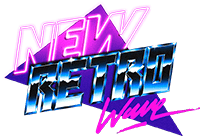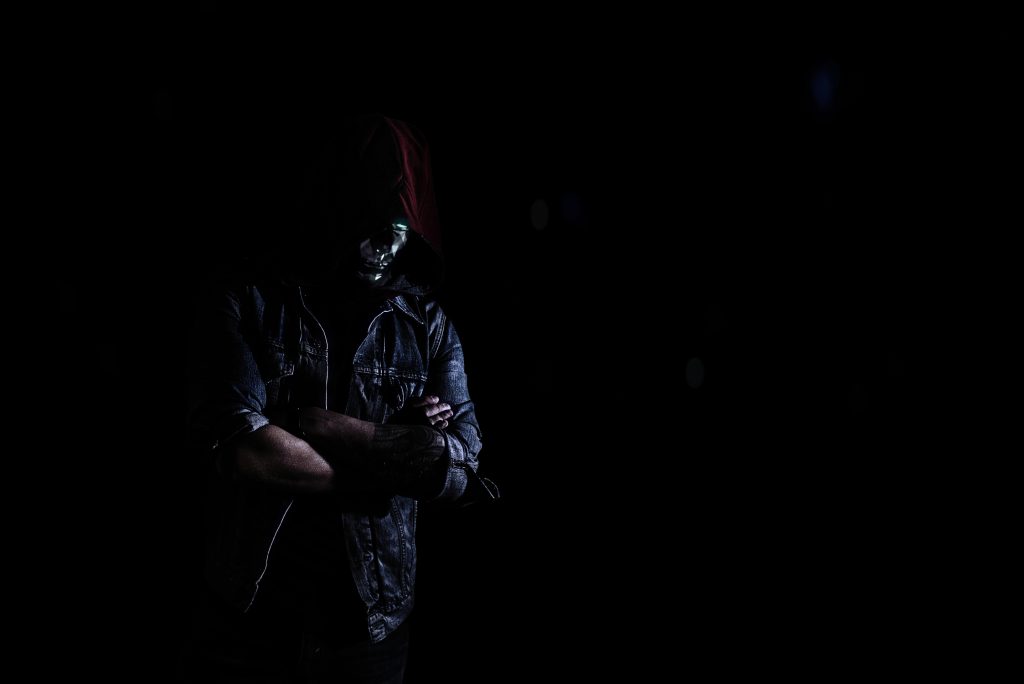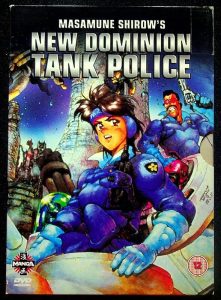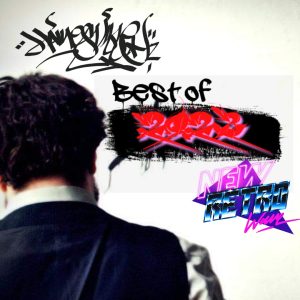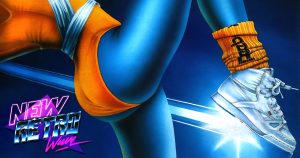Late last month, retrowave powerhouse Starcadian rocked the scene with a brand new instalment in his audiovisual space epic. With its deep red artwork and mind-melting detours into electronic prog-psychedelia, Radio Galaxy expressly refuses to settle into for the tried and true and stands out as one of the most daring and ambitious Starcadian records to date. Having been announced as a concluding chapter in a trilogy of records, the album is sure to occupy the minds of fans eager to crack the secrets behind the project’s extensive mythology. We caught up with the man behind the mask to learn a little more about his approach to writing and outlining ideas within his own conceptual framework.
At what point did you decide that radio would become central to this new Starcadian chapter?
It was on Christmas of 2012! I had just wrapped up Sunset Blood, which was my first foray into electronic music. I was literally learning the concepts of synths as I was writing songs. As I was writing the album, I realized that it was shaping up into a mythology. It was during that time that I started writing the first iteration of ‘Satellites’. As I was writing the mythology and planning what I would do with Midnight Signals, I realized that it would all culminate into the concept of Radio Galaxy: frequencies, feedback loops, time loops, causalities…
Has ‘Satellites’ kept the same role and position in the Starcadian narrative?
It has. That song is pretty key to tying everything from the first single ‘He^rt’ to Radio Galaxy. It forms a loop. The way I formed it in my head is that Midnight Signals I and Radio Galaxy form their own loop, and the entire trilogy is Sunset Blood looping back into Radio Galaxy, like a sub-loop and a loop. There are subtle mirrors and reflections between all three albums to tie them together. I have this obsession with Leitmotivs and I made sure I put all of my creative efforts into coming up with them in beginning and distributing them as I formed more and more of the consecutive albums.
To what extent do you let musical experimentations guide or change the narrative you set out to tell?
Funnily, I did it the most on Sunset Blood and cut it off after Saturdaze. I had a massive collection of songs in the beginning that I retrofitted into a narrative. Once I did that, I started actually building a narrative, which was spurred by doing the ‘He^rt’ video. Ever since then, I’ve basically been laying down a set number of tracks, each with a brief description of how they sound, their cadence, tempo, their narrative lows and highs. I will basically write to that. I also have a pretty comprehensive sketch library where I pick stuff, but when it comes to the narrative I think the overarching story defines things more than the sketches I have at my disposal.
Would you say this approach helps you or is it merely a necessity for the vision you’re aiming for?
I feel it’s a wonderful way to sabotage yourself if you really want to deliver something fast. This is the best way to not do that because it adds the complication of making sure everything ties together and stays consistent. It’s tough when you want to break off and write a bossa nova song or a spaghetti western song. The more weird and extreme the music, the more I’m into it. I relax to the weirdest shit I can find. Whenever I see a framework, I have a tendency to kick sand at it and build things upside down. That’s my instinct at all times. That’s something I keep to myself, I don’t put it on the audience. I fight that battle in me, and hopefully, the resulting product is somewhere in between commercial and completely uncommercial weirdness.
What was it like working on this album with Rob O’ Neil? There must have been some extra constraints in creating an album at such a particular time.
You would think it would hinder us, but the reality is that this is how we’ve always worked. We used to work together before moving to LA. Back in 2010, he texted me telling me he had just found a cockpit for 200$, and that’s basically where it all came from. I never saw him once during the filming of ‘He^rt’. He bought the cockpit, he shot the raw footage and I edited it together, added the visual effects, and that was it! The only time we didn’t shoot something separately was on Freak Night. I flew out to LA in December 2019, which was very lucky timing. We narrowly missed the pandemic.
Other than it being, in my opinion, your most ambitious album to date, I also feel like Radio Galaxy sounds more diverse, dynamic and somehow more guitar-oriented. How would you describe the arrangement and writing process compared to your previous albums?
You’re completely right, it’s definitely a lot more guitar-oriented. I originally played the guitar, I didn’t play the synth or the keys at all, but there was a point in the mid-2000s’ where society decided that we were over guitar music. I think it was during the unfortunate time of dubstep and EDM hitting the charts, which unfortunately shoved guitar out of the door. On the other hand, it also allowed me to open my mind to different instruments and different production techniques, which led to Sunset Blood.
I never quite left the guitar, but I put it down for a little bit. Radio Galaxy marks me coming back in contact with my guitar playing roots, connecting to the spirit of Soundgarden. There’s a lot of Soundgarden on this album. The first CD I bought was Superunknown and it completely defined the way I write lyrics and music, the way I think about signatures and bars… You can definitely hear it on ‘Gutter’, for instance.
I’m still learning how to be a musician and how to write songs and albums. Radio Galaxy is me simplifying but also expanding at the same time, starting with a strict pentatonic guitar-minded way of composing, doing the chord progressions with my hands and leading with my voice rather than writing completely with my fingers on the keyboard and thinking about it in an Ableton, music-production way. It was very freeing. It gave me a new lease in songwriting life. I believe it’s really important for a writing musician to put down their preferred instrument and pick a completely different one. It will completely change the way you structure songs and stories and lyrics.
Some songs even feel like they could be played by a full band.
I think that comes from shedding some of the layers. Sunset Blood with maximalist, layered decadence and Midnight Signals pulled it back a little bit. As you grow, you try to learn to be more scalpel-like with your compositions and instrumentation and shed the layers. I think that this was me subconsciously thinking in band terms.
Musicians talk a lot about the ‘rule of threes’ where you should at all times hear three distinct elements to a song. You don’t need more, the human mind can only focus on three. That principle somehow bore itself into my brain and I held myself from adding too much stuff. Tracks like ‘Lovebeats’ have very few layers. It’s just something where I just wanted to get the point across as simply as I could.
Another noticeable shift marked by this album is its red album cover, a radical departure from the predominantly blue tones of previous releases.
It’s funny that for all the meticulous planning I do, that’s the one thing I didn’t notice until I put the album up on Bandcamp for pre-order. I told myself “Huh, there’s a distinct lack of blue in this, sh-t!” *laughs*.
I would love to say that it was intentional, but it was probably just another subconscious way of shedding the same thing. Midnight Signals was more in the same pool as Sunset Blood, but it was a small, subtle attempt to nudge people out of it with songs like ‘Polyana’ and ‘Trapped in America’, stuff that wasn’t necessarily 80s-inspired or in my usual sound. It was very intentionally peppered there to prepare people for songs like ‘I Demoni’ or Shadowcatcher from last year. It was a gentle way of pulling the listeners in the direction that I want to go towards while keeping my style. I think it was the same deal from a visual perspective. I love dark blues, but this cover felt more like the panic attack that I wanted some of the songs to feel like.
The song ‘Neonhead’ sounds like a term you’d use to describe a fan of retro-synth music, the same way metal fans are referred to as “metalheads”. The line ‘I am Neonhead’ even reminds me of the opening quote in Black Sabbath’s ‘Iron Man’. Does any of this make sense to you?
You’re pretty close! I really enjoyed writing the lyrics to that song. The reason why I call these songs “ear-movies” is that I like to put myself in that mental space when I write them. For this song, I got stuck in this Lovecraftian, neon-soaked cosmic horror world as I was writing it. The metal and Synthwave worlds have such a big overlap, so I put myself in the shoes of 15-year-old metalhead-me and how badass it felt singing ‘Sabbath Bloody Sabbath’. That’s what I was aiming for.
To me, ‘Neonhead’ is the sound of a neon-soaked live show 20 000 leagues under the sea, surrounded by bioluminescent Lovecraftian monsters.
Whereas some of your previous songs such as Trapped in America carried a serious message through a heavy, ominously themed track, it seems like some of your harshest bits of social criticism on this album derive their power from the fact that they’re set to such upbeat, funky tracks. Was there a conscious decision to play on this counterpoint?
Absolutely! I actually got a tweet from a fan today that illustrated this point pretty well: “Only Starcadian can make music that kinda calls me out but also makes me dance to my own flaws”. That’s more or less what I was going for.
I’m not going to sit on a twitter-throne and judge people for specific things, I’m going to call it out with a bit of comedy and satire. Neither ‘Culture’ nor ‘Propaganda’ are me chiding people telling them to not appropriate or start a youtube channel. It’s all stupid. The offensive things that people do are stupid, and the way you’re reacting to them, even though you’re correct, is stupid. It’s all stupid and pointless. So just dance.
It is interesting that a lot of people read ‘Culture’ and ‘Propaganda’ as a critique of Republicans and Far-right people. It’s more about the 15-year-old teenagers that ape and assimilate working-class culture, turning it into an expensive hobby while the actual working class is suffering because of those upper-middle-class families. These kids will make a Youtube channel where they talk about self-fulfilment, self-healing grifts and hustles. It’s all done on the blood of people that don’t do that kind of stuff; people that make your coffee and lunch, drive you to work, clean the building that you work in…
The Internet is a weird place to be in, hence the lyric “the web’s a big mistake”. I feel like your only two options are to either go full alt-right incel, which is the worst possible option you can have, or get into left-wing socialist twitter, where moderation and common sense is out the window.
It’s a very bizarre landscape to release any kind of art into. The only way to break out of that binary classification of art is to adopt this jester-like ribbing of both sides of the argument.
People are lonelier than ever. We’re starving for real conversation, real contact and the only way to do that is to post a hot take for people to interact with you. Democratized art is just piling up, desperately slicing throats and punching babies to get to the top. When I was a kid, “selling out” was a bad word. Right now, people would kill for a sponsorship or promoted video. It’s embarrassing. But because that’s a reality, the only way to stand out from the crowd is to say something genuinely stupid, controversial and out of bounds to get people to talk about you.
Amongst the most notable features of this album are the inclusion of new instruments, most notably on ‘Cannibal Gods’. How did these enter the picture in terms of arrangement?
I found myself in the middle east during that same Christmas in 2012 as I was writing ‘Satellites’. I spent a lot of time there as a child. I’m from Greece, which is a big melting pot of Middle-Eastern and European cultures due to it being conquered by the Turks, Venetians, Moors etc. So a lot of our music is based on Middle-eastern instruments. For instance, the Oud is the predecessor of the Bouzouki, which is a Greek instrument.
It was natural for me to at least do a song where I have a lot of instrumentation that I’m comfortable and familiar with. While I was in the Middle East, I started writing tidbits of that song and trying to imagine what would a Justice song sound like if it was written by Tinariwen. That more or less describes my influences: the Middle-Eastern cultures that I grew up with and French Electronic music.
As with ‘Neonhead’, the phrase ‘Cannibal Gods’ bopped into my head as yet another Lovecraftian cosmic horror vision.
That particular song’s arrangement of traditional instruments and modern sounds actually reminded me of Sepultura.
I love Sepultura! One of the big influences on this album was Sepultura and Mixhell, which is Igor Cavalera and his wife Laima Leyton’s current band. I actually played with them in the Underworld in London. They’re the nicest people on the planet! They have this song called Antigalactic which I’m obsessed with and that was very much inspiring a lot of the songs on this album. One of my favourite albums of all time is also Against by Sepultura. It’s very percussive, full of unimaginable triplets and syncopations. It definitely inspired quite a bit of Radio Galaxy.
Without a doubt the craziest track on the album is the second to last song, “I Demoni”, named after the Italian translation of Dostoïevky’s novel. It feels very Giallo-esque with some Italian Prog influences. How did this song come about?
It’s definitely inspired by Giallo and Night of the Demons. I think this song marks the first time I thought to myself: “F-ck it, I’m just going to make the music I really want to make and not think of it in terms of aesthetics and vibes”. That made it fit even better into the album, weirdly. This is purely distilled Morricone, Mr.Bungle, Goblin and the oodles of metal that I listen to. I approached it as a Goblin song being produced by the band Jamaica. Visually, the song is essentially a splatter-fest in a room full of demons in the last ten minutes of a Giallo movie.
Last time we met, you mentioned that your next songs were going to have some Mr.Bungle influences. Listening to this track, it finally started to make sense. Stylistically, it is easily the most radical shift you’ve done so far.
That’s not going anywhere. The next time I feel like doing something like that, I feel like it will go even further. I don’t know what ‘further’ would sound like, though. It all goes back to that ‘itch’ of wanting to do an album that everyone’s going to either hate or get super confused by. How much you curb that instinct defines you as an artist, I find. If you don’t have that instinct, that’s just weird. Aesthetics is basically how much you allow your mind to deviate from what’s expected of you.
To finish off, can you give us an album, book and film recommendation?
It’s sad because I used to read two books at a time, but Radio Galaxy took up so much of my time that it took up most of the time I wasn’t spending on work. I did listen to an audiobook of Easy Riders, Raging Bulls by Peter Biskind. It’s about the rise and creation of New Hollywood, started by Warren Beatty, Francis Ford Coppola, George Lucas… it’s a monumental telling of how New Hollywood took over.
While I was doing Midnight Signals, I kept noticing that my ‘Discover Weekly’ playlist kept recommending New Disco to me. Ever since then, all of my recommendations are Joe Jackson, Dr.Feelgood… all power-pop, punk, metal and guitar music in general. I think I’m finding my inspiration in guitar music again, just like the good old days.
Film-wise, I’m still in the same space as before. I’m done with American cinema. I think I’m firmly entrenched in Asian and European cinema. I’m just exhausted by Marvel. I’m even exhausted by A24.
My absolute favourite filmmakers right now are Justin Benson and Aaron Moorhead. They made a movie called Resolution and a sequel called Endless. Their first two movies are the most groundbreaking films I’ve seen in a long time. It doesn’t get more meta than those movies. They delve into the nature of films and their viewers, looping and rewatching a film. It very much informed Radio Galaxy and the whole mythology. Their stuff is incredibly exciting and it’s uncategorizable. I don’t think those two films can ever be popular, but they’re a mine for ideas.
Thank you to Starcadian for taking the time to answer our questions!
Starcadian ‘Radio Galaxy’ is out now via Bandcamp and Spotify.
